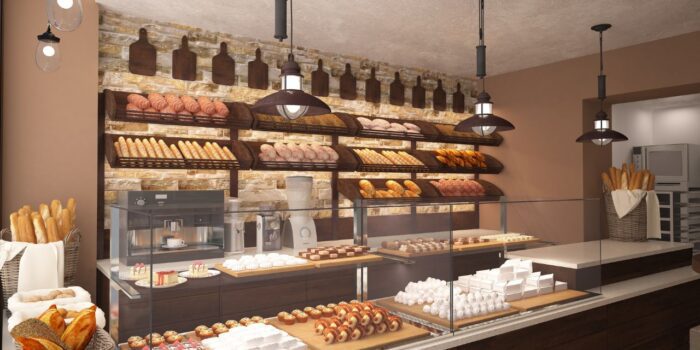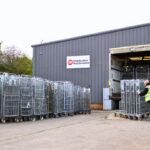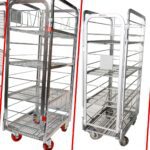How a Durable Bread Tray Can Optimise Your Supply Chain
When it comes to fresh baked goods, speed and reliability are everything. The journey of a loaf of bread, from the oven to the supermarket shelf, is a supply chain that has to be efficient and robust. For that to happen, a simple but essential piece of equipment is needed: the bread tray. It might seem like a minor detail, but a durable, well-designed bread tray can be a powerful tool for improving your entire supply chain, cutting costs, and keeping your products in top condition.
The Unique Challenges of the Bakery Supply Chain
The logistics of bread and other baked goods face a specific set of challenges:
- Perishability: Bread is a fresh product with a short shelf life. Any delay or inefficiency in the supply chain can lead to spoilage and waste.
- Fragility: Baked goods are delicate and easily damaged. Rough handling can lead to crushed loaves, which are unsaleable.
- Hygiene Standards: The food industry has strict hygiene regulations. Equipment used for transportation must be easy to clean and sanitise to prevent contamination.
- High Volume and Frequency: Bakeries often produce goods in high volumes and require frequent deliveries to retailers to keep shelves stocked. This demands a logistical system that is both fast and reliable.
- Space Constraints: Both bakeries and retail stockrooms often have limited space. Equipment must be stackable and space-saving to make the most of every square foot.
The Solution: Investing in a Durable Bread Tray
A durable bread tray is a significant upgrade from flimsy, single-use alternatives. Typically made from robust, food-grade plastics, these trays are engineered to handle the demands of a modern supply chain. Their design and material composition directly address the challenges mentioned above.
- Enhanced Product Protection: Durable trays are rigid and stable. They are designed to protect loaves from being crushed or damaged during stacking, transit, and storage. The structure of the tray itself acts as a protective barrier, reducing product loss and ensuring that goods arrive at the retail store in perfect condition.
- Improved Hygiene: High-quality plastic bread trays are non-porous and easy to wipe down or wash. They can be put through industrial cleaning systems, ensuring they meet the stringent hygiene standards required by the food industry. This prevents the build-up of crumbs, mould, and bacteria, safeguarding food quality.
- Long-Term Cost Savings: While the initial investment in a durable bread tray is higher than a cardboard box, the long-term cost savings are substantial. A durable tray can be reused thousands of times. This eliminates the recurring expense of purchasing and disposing of single-use packaging. The reduction in product damage and waste also contributes to a healthier bottom line.
- Optimised Space: The design of these trays is often stackable when full and nestable when empty. This allows for efficient use of space in both the bakery and the delivery vehicle. Empty trays can be stacked and returned in a fraction of the space, reducing transport costs and optimising valuable storage areas.
Optimising Your Supply Chain with Bread Trays
A durable bread tray doesn’t just hold bread; it actively improves every stage of your supply chain.
1. At the Bakery
In the bakery itself, a high-quality bread tray streamlines operations from the oven to the dispatch area.
- Efficient Cooling: The open design of many bread trays allows for uniform airflow, which is essential for cooling baked goods after they leave the oven. This prevents condensation and keeps crusts crisp.
- Simplified Handling: Trays are designed for easy stacking and unstacking, which speeds up the packing process. Their consistent size and shape make them compatible with automated handling systems and conveyor belts, reducing manual labour and increasing speed.
- Inventory Management: Stackable trays allow for organised, vertical storage of finished goods, making it easier to manage stock levels and prepare orders for dispatch.
2. During Transportation
The journey from the bakery to the retailer is a critical phase. A durable bread tray makes this process more secure and efficient.
- Product Security: The rigid structure of the tray protects against damage during bumpy rides and sudden stops. This means fewer crushed loaves and a higher percentage of salable products on arrival.
- Vehicle Utilisation: The uniform dimensions of bread trays allow for efficient stacking and loading into delivery vehicles. This maximises the use of space in each vehicle, reducing the number of trips required and lowering fuel costs.
- Ease of Unloading: Trays are designed for quick and safe unloading at the destination, allowing delivery drivers to make their drops more efficiently.
3. At the Retailer
A durable bread tray’s benefits continue right to the point of sale.
- Simplified Stocking: Trays can be wheeled directly from the delivery vehicle into the stockroom or even onto the shop floor. This eliminates the need for repacking or transferring goods, which saves time and reduces handling damage.
- Improved Presentation: The consistent and clean appearance of a good quality tray presents a professional image. It allows products to be displayed attractively, enhancing the customer’s perception of quality and freshness.
- Efficient Returns: When the trays are empty, their nestable design makes them easy to collect and store. This streamlines the return logistics, making the process of returning empty trays to the bakery a simple and efficient part of the cycle.
A Comprehensive Approach to Supply Chain Optimisation
To truly optimise your supply chain, you need to look at the bigger picture. A durable bread tray is the starting point, but it should be part of a wider strategy that considers all aspects of your logistics. This includes:
- Hygiene and Cleaning: Having a system in place for the regular, industrial cleaning of your trays is essential. This ensures that every tray is sanitised and ready for the next use, maintaining the highest food safety standards.
- Maintenance and Repair: Even the most durable equipment can suffer from wear and tear. A strategy for the maintenance and repair of your trays is important for extending their lifespan and ensuring they remain in safe, usable condition.
- Fleet Management: Knowing where your trays are at all times is crucial for a smooth operation. Implementing a system for tracking your tray fleet helps to prevent losses and ensures that a constant supply is available for use. (Please also reference trays can be printed with the customer name for easy identification and theft deterrence.)
Introducing Distribution Maintenance’s New Bread Trays
Distribution Maintenance is proud to introduce our new range of high-quality, durable bread trays. Designed specifically to meet the rigorous demands of the bakery and retail supply chain, these trays are a direct answer to the challenges of transporting fresh goods. Our new bread trays are made from robust, food-grade plastic, ensuring they are not only strong enough to protect your products but also easy to clean and sanitise, adhering to the highest hygiene standards. They are designed for both stackability when full and nesting when empty, providing an efficient solution for space management in your operations.
Investing in our bread trays means investing in a long-term solution that reduces costs, minimises product damage, and streamlines your logistics from the bakery to the shelf.
To learn more about our new bread trays or to request a quote, please contact Distribution Maintenance today.
The Strategic Value of a Durable Bread Tray
The humble bread tray is a cornerstone of the baked goods supply chain. By investing in a high-quality, durable version, businesses can achieve significant operational efficiencies, reduce costs, enhance product protection, and improve hygiene standards. From the bakery floor to the retail shelf, a durable bread tray streamlines every step of the journey. It’s a strategic asset that underpins reliability and quality, proving that sometimes, the simplest solutions can have the most profound impact on your business.









